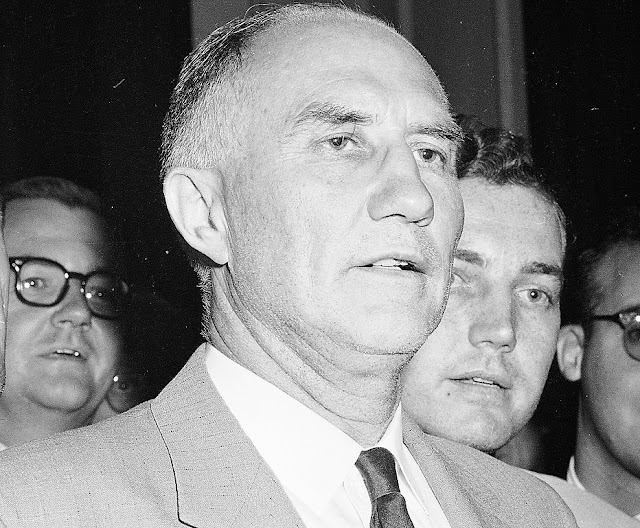“I’ll tell you what’s at the bottom of it. If you can convince the lowest white man he’s better than the best colored man, he won’t notice you’re picking his pocket. Hell, give him somebody to look down on, and he’ll empty his pockets for you.” Lyndon Baines Johnson 1964.
It's poison bore fruit again in 1951 and in South Carolina. Harvey LeRoy "Lee" Atwater was born on 27 February, in Atlanta, Georgia, but in April his family moved to Charleston, South Carolina (above).
And on 12 July, William Robert Horton was born near the little segregated sand hill farming town of Chesterfield, South Carolina (above). Lee Atwater was white. William Horton was black. But it was the personality traits they shared which shaped the story that would follow.
William's father was a trash collector and an alcoholic. When William was 5 the police locked up his father for shooting his mother. Shortly thereafter the battered Mrs. Horton left the little boy with his maternal grandmother and disappeared. William grew up in a state still tied to cotton, hand picking it or processing the crop in local textile mills. Despite being warned he would end up on a chain gang like his father, William Horton dropped out of school in the 8th grade.
In 1956 Lee Atwater's father - an insurance adjuster - moved his family to the Savanna River town of Aiken, on the Georgia border, just down the street from ex-Governor Strom Thurmond. Lee trick-or-treated at Thurmond's home and remembered, "He came out and gave me a Snickers candy bar. That was the best thing I got that year.” Working after school, the hyperactive Lee seemed destined for success, and when his 8th grade class took a trip to Washington, D.C., Lee Atwater (above) posed sitting at the feet of Senator Thurmond.
William Horton was first arrested at the age of 15 in 1971. He was convicted of breaking and entering, and served 6 months in a juvenile facility. Shortly after his release he was arrested again for assault with a knife, with intent to kill. This time he served 3 years in a penitentiary. Upon release William left South Carolina and headed north to connect with family.
In 1974 he was charged with 11 offenses in and around the old mill town of Lawrence, Massachusetts (above) including public drunkenness, assault and battery and selling drugs.
After high school, Lee Atwater attended a private Lutheran college in Newberry, and in 1968 helped register voters pledged to support Richard Nixon. But as his younger brother Eric pointed out, party philosophy held little interest to Lee. “He liked politics because he could kick the other guy's ass.” Then in 1973 Atwater transferred to the University of South Carolina. A college girl friend recalled, “...the opportunist in him...would almost always overrule the nice guy...”
That year Atwater ran the campaign that elected his friend Karl Rove (above) as President of the College Republicans. In 1977 Lee Atwater graduated from the University of South Carolina with a Master's degree in Communications.
About 9:30 pm on Saturday, 26 October, 1974, William Horton along with two other drug dealers, Alvin Wildman and Roosevelt Picket, left a party in Lowell, Massachusetts. Fifteen minutes later their car was seen parked near the Mobile gas station on Marston Street.
About 9:50 pm the attendant, 17 year old Joseph Fournier (above), was found stabbed 19 times in the neck and chest. He bled to death, stuffed bent double into a trash bin with his feet against his face. The total amount stolen from the station was $276.37. In September 1975 Horton and the others were convicted of murder and sentenced to life imprisonment without the possibility of parole.
Lee Atwater (above right) confessed, “I probably would have never even gotten into politics if it weren't for Strom Thurmond (above, left) .” It was at Thurmond's suggestion that 36 year old State Senator Carroll Campbell hired Atwater to manage his 1978 campaign for the South Carolina 4th Congressional District seat. His Democratic opponent was the popular mayor of Greenville, Max Heller. There was also a third party candidate, an itinerant preacher named Don Spouse.
Polling indicated Heller had a 14 point lead until the final week, when Spouse held a well attended press conference to announce, “I believe in Jesus Christ...Mr. Heller does not.” Spouse added that a Jew should not represent South Carolina. Spouse won only 1,693 votes, but Campbell beat Heller by 5,893 votes. Lee Atwater later took credit for recruiting Spouse, who never ran for office again.
In the summer of 1979 Ed Rollins (above, right) was hired to assemble a staff for Ronald Reagan's 1980 Presidential campaign. He remembered, “ Strom Thurmond was trying to get Lee a job.” Rollins agreed to interview Atwater (above, left), and was surprised. “Here's this young kid without a real resume...but there was something about his eyes. He had these piercing eyes...the eyes of a killer.” Rollins hired Lee as a political consultant.
William Horton's first months in prison were difficult, and he was written up almost a dozen times by the staff. But by his 6th year William had become a model prisoner. Beginning in 1985 William Horton was given 10 two day furloughs. Most state prisoners at the time were eligible for weekend furlough programs, as a way of rewarding good behavior and to further rehabilitation. Massachusetts was the only state which extended this privilege to convicted murderers.
The on 6 June, 1986 William went on yet another furlough. He saw a movie and stopped at a convenience store, where he bought a winning lottery ticket. The money funded a drug binge, which led to William crashing a car. Horton now ran. Using buses and stolen cars he got to Florida, where he found construction work. A year later William lost his job, and moved to Baltimore where he stayed with friends, until the 4th of July weekend of 1987, when he went looking for a house to break into in Maryland.
In the March 1980 South Carolina Republican primary, Ronald Reagan (above, right) had two opponents – John Connally and George Bush. Lee Atwater (above, center) “leaked” negative stories about both sides to both sides. Connally supposedly tried to buy 100,000 votes from black churches, and Bush was accused of being a member of the infamous “Trilateral Commission”. Lee Atwater would later claim, with some support, to have played both sides against the other, so that Reagan would win what the Washington Post described as a “mean and dirty”, campaign, “'..in the worst tradition of the politics of the Old South.”
In November of that same year Lee confessed to winning another election via a smear, “Well, I said that he had been hooked up to jumper cables, in reference to a bout he had with mental illness in college...”
It would be foolish to assume that William Horton (above) committed only those rapes and assaults for which was arrested and convicted, such as the July 1987 break-in assault and rape of Angela Miller and Clifford Barnes.
It would be equally foolish to assume that Lee Atwater was responsible for all of the reprehensible attacks he would later claim credit for. However it also seems obvious these two sons of the Palmetto state shared a certain set of personality traits - they both, “habitually and pervasively disregard or violated the rights and considerations of others without remorse.”
The 5th edition of the Diagnostic and Statistical Manual of Mental Disorders says persons such as Atwater and Horton, “...may be habitual criminals....or they may...manipulate and hurt others in non-criminal ways which are widely regarded as unethical, immoral, irresponsible...Those with APD often possess an impaired moral conscience and make decisions driven purely by their own desires without considering the needs or negative effects of their actions on others.” The syndrome is defined as antisocial personality disorder.
It was the decision of the Republican party to accommodate racism in order to assemble a winning coalition. It was the choice of the Republican party to elevate those with an “impaired moral conscience” to leadership roles because they produced success. The profit from those decisions would be reaped in the last two decades of the 20th century and the first decade of the 21st century by Ed Rollins (center) and Lee Atwater (right). And the bill would be deferred until the second decade of the 21st century, delivered by Republican operative, Roger Stone (left)










































































